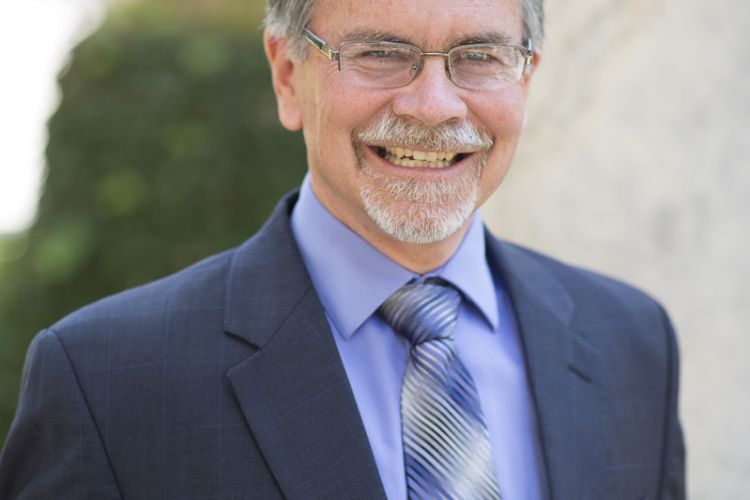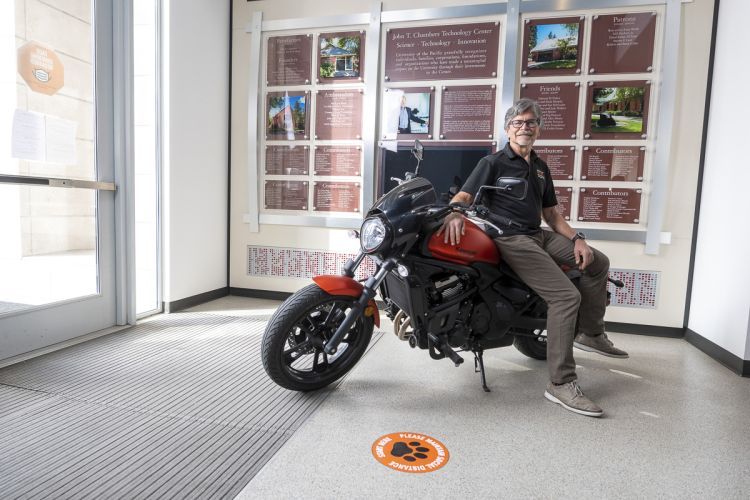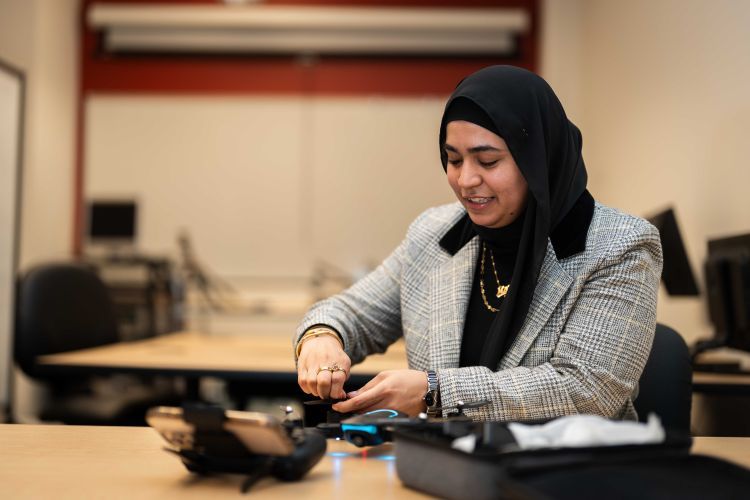Breadcrumb
Retiring engineering/computer science dean will leave lasting legacy

Steve Howell is set to retire on June 30 as dean of the School of Engineering and Computer Science at University of the Pacific.
Steve Howell’s four decades in engineering education began with his use of a slide rule and a $400 Texas Instruments pocket calculator and concludes with him watching students utilize laser cutters, implement virtual reality and harness the power and versatility of computers.
Howell retires June 30 as dean of the School of Engineering and Computer Science at University of the Pacific. He has helped build and lead a school that boasts a tremendous employment rate after graduation, a half-century tradition of career-enhancing cooperative education work and ground-breaking diversity, equity and inclusion efforts.
He has been a college student, professor, provost, president, dean—and a unifying campus presence.
“We are like a family at Pacific and it is very difficult to say goodbye to so many people via Zoom. This has been the strangest, weirdest year possible to end a career,” Howell said. “But it was memorable in other ways. I taught a PACS (general education) class this year, and it was my first time back in the classroom in 10 years … I will leave here with so many great memories.”
“Steve has provided stability and has moved the school forward,” said Jose Hernandez ’84, a former NASA astronaut and icon of the engineering and computer science school. “The faculty and staff are so engaged in doing all they can to help students.”
Howell came “full circle” in second Pacific stint
Howell’s career path has brought him to Pacific and the Stockton Campus twice.
In 1983, fresh off his doctorate at age 29, Howell became a founding member of Pacific’s mechanical engineering department. Among the other stops in his career were Northern Arizona University as a professor, Lawrence Technological University in Michigan as associate provost and dean of graduate programs, and the Ford Motor Company as a design engineer and consultant. From 2010 to 2013, he was vice chancellor (president) and founding provost at the new Botswana International University of Science and Technology in Africa.
“I had a wonderful experience at Pacific the first time, but I never imagined that I would come back here at some point,” he said. “In Botswana, they asked if I wanted to extend my contract. It was a very rewarding experience there, but I wanted to come back to the United States. I sent applications to various universities and I was contacted by Pacific. I came home for Christmas in 2012 and took a detour to visit the campus and interview. Stepping back on campus, so much that I saw was the way I had remembered it. I thought ‘Wow, this is a place I’d like to be.’ It worked out and I came full circle.”
Innovative programs and a commitment to students
Howell’s tenure as dean has been marked by innovation, creativity, consistency and caring. Pacific was ranked the No. 60 undergraduate engineering program in the country by U.S. News & World Report in 2021.
The school’s Cooperative Education program places students with firms for experiential learning. Dean Robert Heyborne started the program in 1969.
“The school was kind of floundering and a niche was needed,” Howell said. “Dean Heyborne started the Co-Op program and it set us apart from engineering schools at other universities. After graduation, with the experience they gain, students are able to hit the ground running. We have maintained our focus on the program and it continues to grow.”
The program contributes to the school’s job-placement rate after graduation—98%.
“We take pride in that job-placement rate,” Howell said. “More than half of those who take part in the Co-Op program are offered jobs by their firms,” he said. “They may or may not take the jobs because many have multiple offers and some take a gap year off.”
Under Howell’s leadership, the school was the first at Pacific to appoint a diversity coordinator. All of Pacific’s schools and colleges now have diversity, equity and inclusion leads.
“Diversity by race and by gender is essential in engineering and computer science,” Howell said. “We have five children and one, my daughter Rachel, went into engineering (mechanical). She is a woman in a male-dominated field and she had to be really tough. She recently defended her dissertation in Holland and I was able to watch it virtually.”
“For me, it’s personal to get more women and people of color in the field. Diverse teams create more innovative and creative solutions. And everything in engineering is now done in teams. You won’t find one engineer working by themselves. Diversity, equity and inclusion is needed, and it is also very important from a business perspective.”
Hernandez said the Co-Op program makes Pacific unique from many other engineering schools.
“Students basically enter their careers with a year of experience and that makes such a difference,” Hernandez said. “Steve has been a real proponent for the program and the impact it has on students when they enter the workforce.”

Riding into retirement
Yes, the motorcycles must be mentioned. Howell’s love for motorcycles was featured recently in the school magazine, “The Rock.”
Over the years he has owned a Honda, a Harley-Davidson and, currently, a Kawasaki touring bike—appropriately, a Pacific burnt orange color. “He must be all right if he rides a bike,” joked Hernandez, himself a motorcycle rider.
Howell will take that motorcycle to Bend, Oregon, where he and wife Debi plan to retire. They have adult children on the West Coast and a granddaughter in Washington state.
The myriad outdoor activities in and around Bend make it an ideal place for Howell to retire. He already is contemplating hiking, backpacking, mountain biking, skiing and more. He also hopes to be back in Stockton for Homecoming in October.
Howell retires “very pleased” with where the school stands and confident that his successor, Elizabeth Orwin from Harvey Mudd College, will “take us to great places.”
“We had many great plans, and COVID-19 upset some of those. But the long-term prognosis is great,” Howell said. “You look at how we are getting through this pandemic and a lot of it is because of science and technology. I tell students this is the ideal time to go into science. The opportunities that are in front of us are amazing.”
Pacific establishes The Howell Fund
Pacific has started the “Steve Howell Fund for Initiatives in Diversity and Experiential Learning”—also called “The Howell Fund.” The fund will directly support the school’s Co-Op program and initiatives involving diversity, equity and inclusion.
Mail: Make checks payable to University of the Pacific/Howell Fund, and mail to Advancement Services, University of the Pacific, 3601 Pacific Avenue, Stockton CA 95211.
Online: pacific.edu/HowellFund
Phone: Call 209.946.2643, Monday through Friday, 8 a.m. to 5 p.m. PDT





